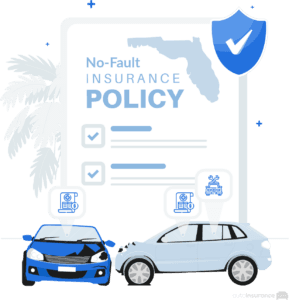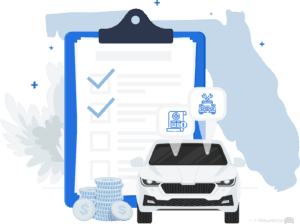

No-Fault Auto Insurance in Florida
What Florida’s no-fault laws mean for your auto insurance claims and costs
Compare quotes from top providers

No-fault insurance is coverage that pays medical expenses for a driver and passengers in any auto accidents. In so-called no-fault states, this means that even if a car accident with another driver is your fault, each driver files medical claims with their own insurance providers, not the other party’s. While “no fault” sounds positive, no-fault laws have led to more fraud, more lawsuits, and higher auto insurance costs in Florida.
Will the no-fault laws be overturned, or will Florida drivers continue to pay high rates for auto insurance compared to the rest of the U.S.?
Florida
Let’s take a step back and define what no-fault auto insurance is in general.

What Is No-Fault Insurance?
No-fault insurance means that each party covers their own medical costs, regardless of whose fault the accident was. Coverage of these costs is also called personal injury protection, or PIP. In Florida, PIP coverage pays only for the first party, the person on the insurance policy. The at-fault driver will still need to pay for the other party’s property damage, just not their bodily injuries.
How Does No-Fault Insurance Work?
Say you get into an accident and it’s your fault. You and the other party would both contact your own insurance providers to cover your medical costs (first-party claims). However, you’d still be on the hook to pay for the other party’s property damage, so that party would file a claim with your insurance provider (a third-party claim). If the claim wasn’t your fault, you’d file a third-party insurance claim with the other party’s provider.
What It Covers
- Your medical payments
- The not-at-fault party’s property damage
- Lost wages
- Other economic damages
What It Doesn’t Cover
NOTE
To cover what no-fault insurance does not, you’ll need collision and comprehensive coverage, which are not required in the state of Florida (or any state, for that matter).
Pros and Cons of No-Fault Laws in Florida
No-fault insurance laws in Florida have more negatives than positives for all drivers.
Pros
No paying for someone else’s medical bills: If you get into an at-fault accident, your insurance provider won’t have to cover the other party’s medical payments, only your own injuries and the other party’s property damages.
Cons
More lawsuits: Although you won’t be on the hook for the other party’s medical costs, the injured party has up to four years from the accident to sue you in a personal injury lawsuit. However, they can only sue you if their injuries are of a certain severity. These are the injury thresholds in Florida:
- Death
- Permanent injury “within a reasonable degree of medical probability”
- Permanent and significant loss of an important bodily function
- Permanent and significant scarring or disfigurement1
If you lose the lawsuit, you could be on the hook for the other party’s medical payments anyway, not to mention legal fees. No-fault auto insurance laws lead to more lawsuits, as injured parties don’t want to pay for their own medical costs for accidents they didn’t cause.
More fraudulent claims: No-fault insurance laws lead to more fraudulent insurance claims. Believe it or not, there are corrupt doctors, lawyers, and chiropractors who help people take advantage of PIP benefits by submitting false claims. More fraud leads to higher premiums, as auto insurance providers take these fake claims into account when determining the cost of auto insurance.
Higher costs: The high rates of lawsuits and fraud make Florida the sixth most expensive state for auto insurance.2 While the national average annual expenditure for auto insurance is $1,047 based on 2020 estimates, the average cost in Florida is $1,372, 31 percent higher than the rest of the country.3
On average, no-fault states’ annual auto insurance costs are 5 percent higher than the national average. In states like Pennsylvania, Kentucky, and New Jersey, where drivers can choose between at-fault and no-fault coverage, the average costs are 10 percent higher than the national average. In contrast, the cost of auto insurance in no-fault states is 3 percent lower than the national average.
| State insurance laws | Average yearly spending on car insurance in 2018 | Percentage higher than the 2018 national average (rounded to nearest whole number) |
|---|---|---|
| At-fault | $964.11 | -3% |
| No-fault | $1,055.43 | 5% |
| Drivers’ choice between at-fault and no-fault | $1,104.58 | 10% |
Unfortunately, the average cost of auto insurance in Florida is only getting higher. From 2014 to 2020, the average cost of auto insurance in Florida increased by 20 percent, as did the national average.
| Average annual spending on auto insurance | Florida | U.S. | Year-over-year difference of the annual cost of auto insurance in Florida | Percentage difference than U.S. average |
|---|---|---|---|---|
| 2014 | $1,145 | $869 | N/A | 24% |
| 2015 | $1,191 | $897 | 4% | 25% |
| 2016 | $1,262 | $945 | 6% | 25% |
| 2017 | $1,353 | $1,006 | 7% | 26% |
| 2018 | $1,426 | $1,057 | 5% | 35% |
| 2019 | $1,414 | $1,070 | -1% | 24% |
| 2020 | $1,372 | $1,047 | -3% | 31% |
Clearly, people prefer a lower cost of auto insurance. Is the Florida Legislature doing anything to keep costs to a minimum?
Proposed Legislation
When it comes to Florida’s no-fault auto insurance laws, we have some good news followed by some bad news. In April 2021, the Florida Senate passed legislation that would repeal no-fault legislation. Specifically, this is what the legislation would have done:
- All drivers would be required to have a minimum bodily injury liability coverage of $25,000 per person and $50,000 per accident.
- Drivers would not be required to have medical payments coverage or PIP.
In other words, this legislation would have changed Florida from a no-fault state to an at-fault state.4
But notice that we’re writing in the conditional tense. That’s because, in June 2021, Florida’s Gov. Ron DeSantis rejected this bill, keeping Florida as a no-fault system.5 So don’t expect lower prices for auto insurance anytime soon.
Why Was My PIP Claim Denied?
So you got into an accident and filed a PIP claim, and your insurance provider denied it. There are a few possible reasons for this denial.
- Nonpayment: If you’ve missed paying your premiums, your insurance provider has 10 days prior to the effective date to notify you of a midterm cancellation. Canceling your insurance means the company will not cover your injuries or medical treatment (PIP coverage). To reinstate your auto insurance, you’ll typically need to cover the missed payments. But even if you reinstate your policy, it won’t be retroactive, so you won’t get that injury covered. No wonder so many companies give auto insurance discounts to those who enroll in automatic billing!
- Lack of evidence: If you didn’t file a police report for your insurance claim or provide sufficient evidence, your insurance company could deny coverage.
- Fraud: If your insurance company thinks your claim is fraudulent, it can deny coverage. That’s why it’s important to provide only accurate information for your medical costs and mileage reimbursements to and from medical care.
- Failure to seek medical care in time: If you didn’t seek medical care within 14 days of your accident, your insurance company can deny your claim under Florida Statute 627.736.
Minimum Car Insurance Requirements in Florida

If you’re seeking car insurance in Florida for the first time, familiarize yourself with Florida’s minimum car insurance requirements:
- Medical payments coverage of at least $10,000 per person and $10,000 per accident
- Property damage coverage of at least $10,0006
TIP
If you can afford it, buy more than the minimum coverage required in Florida. We recommend full coverage, which includes bodily injury, comprehensive coverage, collision coverage, and coverage for uninsured or underinsured motorists.
Other No-Fault States
Florida isn’t the only no-fault state in the U.S. — far from it. Here are the other states with no-fault auto insurance laws:
- Arkansas
- Delaware
- Hawaii
- Kansas
- Massachusetts
- Michigan
- Minnesota
- New York
- North Dakota
- Oregon
- Texas
- Utah
In the following states, drivers can choose between at-fault and no-fault coverage:
- Pennsylvania
- Kentucky
- New Jersey
Recap
If you want even more information about Florida car insurance, read about cheap car insurance in Florida, auto insurance for Florida seniors, or whether you need insurance to register a car in Florida.
Although Florida’s minimum auto insurance requirements are relatively minimal for the U.S., it’s still one of the most expensive states for auto insurance. That’s why it pays to do your research before you pay for a policy.
Citations
The 2021 Florida Statutes. Online Sunshine. (2022).
http://www.leg.state.fl.us/statutes/index.cfm?App_mode=Display_Statute&URL=0600-0699/0627/Sections/0627.737.htmlBackground on: No-fault auto insurance. Insurance Information Institute. (2022).
https://www.iii.org/article/background-on-no-fault-auto-insurance2019/2020 Auto Insurance Database Report. NAIC. (2023, Jan).
https://content.naic.org/sites/default/files/publication-aut-pb-auto-insurance-database.pdfAuto Insurance Database Report. NAIC. (2021, Feb).
https://content.naic.org/sites/default/files/publication-aut-pb-auto-insurance-database.pdfSENATE PASSES LEGISLATION TO REPEAL FLORIDA’S MOTOR VEHICLE NO-FAULT LAW. The Florida Senate. (2021, Apr 14).
https://www.flsenate.gov/Media/PressRelease/Show/3957DeSantis vetoes proposed No Fault Motor Vehicle Insurance law in Florida. WFLA. (2021, Jun 30).
https://www.wfla.com/news/florida/desantis-vetoes-proposed-no-fault-motor-vehicle-insurance-law-in-florida/Florida Insurance Requirements. Florida Highway Safety and Motor Vehicles. (2022).
https://www.flhsmv.gov/insurance/